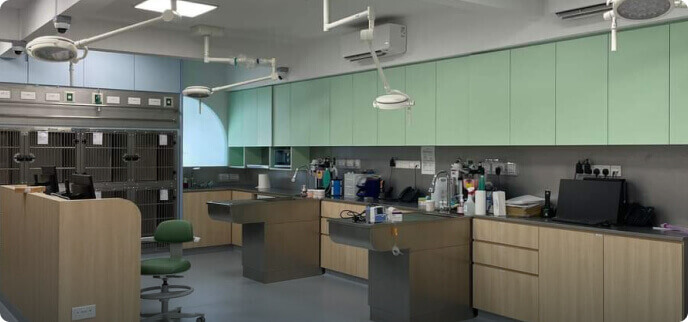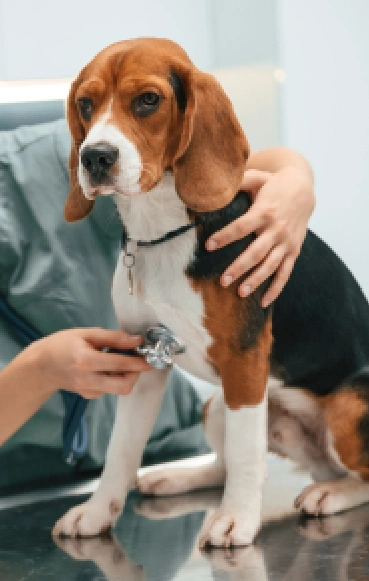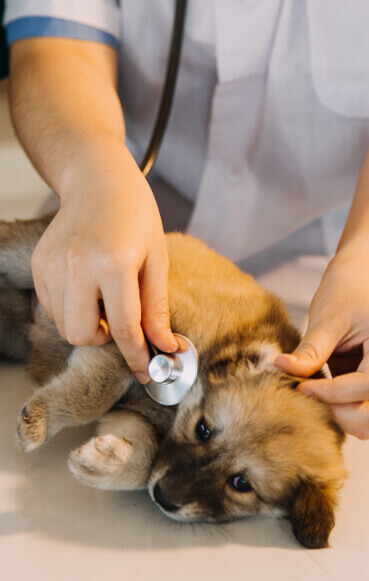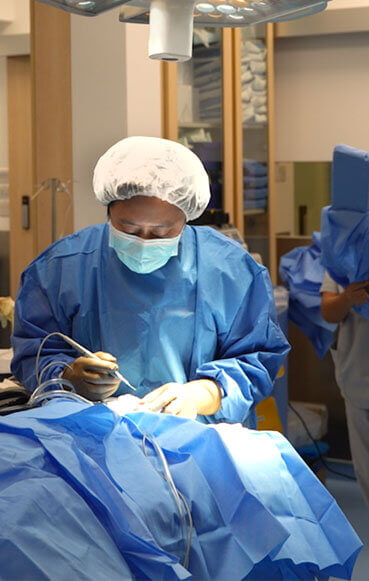Heart disease affects an estimated 10 to 15% of all dogs and cats, with the prevalence increasing dramatically with age. By the time symptoms like coughing, lethargy or difficulty breathing become apparent, the disease is often advanced. This makes treatment options like Transcatheter Edge-to-Edge Repair (TEER) crucial for fur parents in Singapore seeking the best possible outcomes for their companions.
What Is Transcatheter Edge-to-Edge Repair (TEER)?
TEER is a minimally invasive procedure that repairs faulty heart valves without the need
for open-heart surgery. Using a specialised V-Clamp device, TEER helps restore proper
blood flow through the heart and reduces the risk of complications such as heart
failure.
This procedure is most often recommended for pets with serious valve disorders,
particularly small-breed dogs prone to heart disease, though cats may occasionally be
affected as well. By providing a safer alternative to traditional surgery, TEER offers
new hope for pets living with advanced heart conditions.
Some of the main conditions TEER addresses include:
- Myxomatous Mitral Valve Disease (MMVD): The most common heart condition in dogs, especially in small breeds like Cavalier King Charles Spaniels, Dachshunds and Maltese breeds. This disease causes the mitral valve to weaken and deform over time.
- Mitral Regurgitation: This condition occurs when the mitral valve fails to close properly, allowing blood to leak backwards into the left atrium instead of flowing forward into circulation. This backflow places extra strain on the heart and may progress to heart failure.
- Congenital Valve Defects: These are structural heart abnormalities present from birth. While less common, they can become significant as the pet matures and may require corrective intervention.
Key Benefits of TEER for Pets
TEER offers several advantages over traditional open-heart surgery for pets with serious valve disease:
1. Minimally Invasive Approach
One of the most significant advantages of TEER lies in its minimally invasive nature,
making it an optimal option for pets who might otherwise face limited treatment options.
Unlike traditional heart surgeries that require opening the chest and sometimes using a
heart-lung bypass machine, TEER eliminates the need to break the sternum. This approach
prevents the extensive tissue damage associated with open-chest procedures.
2. Faster Recovery for Pets
While traditional cardiac surgery might require a week or more of hospitalisation, TEER
patients typically go home within 2 to 3 days. The reduction in hospital time is
valuable as pet boarding spaces at veterinary clinics may cost a substantial amount.
TEER also enables pets to recover in their familiar home environment sooner. There, they
can enjoy their favourite sleeping spots, regular meal routines and the comfort of their
human family’s presence.
3. Reduced Risk of Complications
The TEER procedure has a success rate of approximately 95% in pets and is performed exclusively by a qualified veterinary doctor. While minor risks such as temporary irregular heart rhythms or slight bleeding at the catheter site may occur, these are far less serious than the potential complications associated with open-heart surgery.
4. Improved Heart Function and Circulation
The V-Clamp device used in TEER works by bringing the valve leaflets together, restoring proper function and enabling the heart to pump more efficiently. As a result, the harsh, abnormal sounds caused by blood leaking backwards through damaged valves (regurgitation) are often greatly reduced once normal valve function is restored.
5. Reduced Heart Medication Dependence
Improved heart function after TEER means pets may require fewer heart medications or lower dosages of their existing prescriptions. This helps reduce side effects such as kidney strain, loss of appetite, or digestive upset. It also potentially lowers long-term costs, as cardiac medications for pets with advanced heart disease can add up to thousands of dollars each year.
6. Improved Exercise Capability
With better blood flow and reduced valve leakage after TEER, pets often show a remarkable boost in energy and exercise tolerance. Many can once again enjoy morning walks or playful afternoons without the laboured breathing and fatigue that previously limited their activities.
7. Improved Quality of Life
One of the most noticeable improvements after TEER is the reduction or even elimination of persistent coughing. Pets with heart disease often struggle to rest comfortably due to breathing difficulties, especially when lying down. By easing these symptoms, TEER allows them to sleep more soundly and comfortably.
8. Extended Lifespan
By improving heart function and reducing the severity of mitral regurgitation, TEER can help extend the lifespan of pets with mitral valve disease. It also helps delay the onset of congestive heart failure, allowing pets to maintain a good quality of life for longer. During this time, most pets continue enjoying their normal activities with their families, rather than merely surviving with progressive disability.
Is Your Pet a Candidate for the TEER Procedure?
While TEER is beneficial for older pets and those diagnosed with serious valve disorders, it is only suitable under specific conditions. Pets may be considered good candidates if they:
- Weigh between 4–15 kg.
- Have been diagnosed with mitral valve disease stages B2, C or D by a vet clinic.
- Do not have advanced (late-stage) atrial fibrillation.
If you think your pet may be a candidate, contact us to schedule a consultation with Dr Nicholas Woo. Our team will carefully assess your pet’s heart condition, review all possible treatment options, and guide you in making the best decision for your pet’s health and well-being.

Bedok (24 Hrs Vet Clinic)
26 Jln Pari Burong, Picardy Gardens, Singapore 488692 (Shophouse along Upper Changi Road)
Operating Hours: 24 Hours Daily
Balestier (Vet Clinic)
564A Balestier Road, Singapore 329880
Opening Hours: 9am - 9pm Daily Closed on Tuesday & Public Holidays







